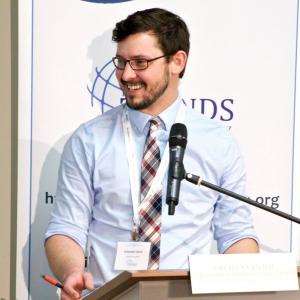FROM THE UCSB CURRENT [click here to read original source]:
With the carnage in Paris and San Bernardino still fresh, terrorism seems inescapable these days. For all the attention it receives, however, the study of terrorism — even its definition — is still evolving.
In what promises to be a significant contribution to the field, UC Santa Barbara hosted “The Constructions of Terrorism,” a conference organized by TRENDS Research & Advisory, a think tank based in Abu Dhabi, United Arab Emirates, and campus-based Orfalea Center for Global & International Studies.
Known as the TRENDS-Orfalea Constructions of Terrorism Project, it was conceived as a multiyear collaboration, said Michael Stohl, director of the Orfalea Center, who organized the conference with Ahmed al-Hamli, president and founder of TRENDS. The inaugural conference took a multidisciplinary approach, with more than a dozen researchers presenting papers on a wide range of topics.
“The conference was a big success, as seen not only by the organizers and the participants but also the audience, many of whom attended the entire two days of discussions,” observed Stohl. “We brought together prominent scholars from across multiple disciplines and a prominent journalist with experience covering terrorism and had two days of highly interactive presentations and discussions.
“There is no question that the interactions will serve to benefit each of our individual research programs, and a number of joint research collaborations across disciplinary frontiers are being discussed and are likely to develop.”
Stohl and al-Hamli conceived of the conference at a TRENDS forum in Abu Dhabi last year. The project features research support by TRENDS and sponsorship of four workshops. The next event will take place in April 2016 at the Stimson Institute in Washington, D.C.
“UCSB has been at the locus of theory, research and analysis on terrorism,” noted Melvin Oliver, executive dean of the College of Letters & Science and the SAGE Sara Miller McCune Dean of Social Sciences. “Starting with the pioneering work of Mark Juergensmeyer, the founding director of the Orfalea Center for Global & International Studies and continuing with a host of other scholars, it is not surprising that TRENDS and the Orfalea Center would begin this marvelous partnership with a conference on this topic.”
Juergensmeyer, a professor of sociology and of global studies, was among the conference presenters. “This was a remarkable gathering of some of the country’s leading experts on terrorism,” said Juergensmeyer, who spoke on “Terror as Performance Violence.” “Though they came at the subject from diverse perspectives, they were remarkably in agreement that government leaders and the public should be wary of overreacting to terrorist acts in ways that strengthen terrorism.
“Terrorist acts are done for specific purposes,” he continued. “In the case of recent acts by ISIS, these are calculated to elicit fear of Muslims and encourage a war mentality that strengthens their hands and enables ISIS to recruit more volunteers from around the world. We need to respond, but with careful measures that undercut ISIS rather than strengthening it.”
In addition, Stohl and graduate students Benjamin Smith and Andrea Figueroa-Caballero, postdoctoral scholar Scott Englund and undergraduate Elena Salcido presented their analysis of media representations of terrorism, drawing upon more than 100,000 articles in the New York Times and Wall Street Journal.
The stories, they said, in part demonstrated how much of the current discussion of terrorism is framed. They are defined not simply in acts as they occur, but within a perceived understanding of al Qaeda the organization and al Qaeda the terrorist threat; these perceptions, rather than the threats and acts that now confront us, are the origins of the responses that we both consider and endorse. The result, they said, is a continuing misunderstanding of the nature of the threat and the responses that might be appropriate.
Al-Hamli, who founded TRENDS in 2014 as an independent research center, said the study of terrorism has taken on new urgency. “Terrorism is now becoming more important and complicated,” he noted.
“How can we differentiate between criminal activities and terrorism?” he continued. “This is very important. Now, it just happened in California. This crime, this tragedy that killed 14 people and injured 20 — how can we describe this type of event? Is this terrorist activity or a crime? Because this is different now.”
– See more at: http://news.ucsb.edu





